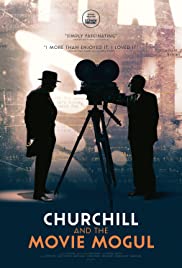
CHURCHILL AND THE MOVIE MOGUL
UK, 2019, 59 minutes, Colour.
Directed by Johnny Fleet.
An hour-long documentary that will be of interest to film buffs, will be of interest to audiences interested in the history of British politics in the 1930s and during World War II, especially as embodied in Winston Churchill.
While there are quite a number of talking heads, starting with Stephen fry, a number of film producers, authors of books on Alexander Korda and Churchill, excerpts from Elliot Roosevelt, Churchill’s son and grandson and daughter-in-law, his various secretaries and politicians, there are also a lot of excerpts from the films by Alexander Korda as well as newsreel footage from the period and the filming of various speeches by Churchill, especially to the American Congress.
Churchill is the focus, allusions to his British ancestry, aristocratic with the Earl of Marlborough, his American mother, Jenny to Rome. There is mention of his escape from prison by the latrine during the ball war. The film shows him in the political doldrums in the 1930s, his warning about Hitler’s rearmament and its being dismissed by those interested in appeasement. It shows his new popularity with the outbreak of war, his eventually becoming Prime Minister, his famous words of encouragement, various patriotic speeches.
But the film reveals his friendship with Alexander Korda, meeting in 1934, a friendship, his writing screenplays and film treatments and being paid for them, his presence on set. The thesis of this documentary is how cinematically minded Churchill was, even illustrating some of his famous speeches with more footage to indicate their impact on his public’s imagination and the urging to patriotism.
But Alexander Korda is also the centre of the documentary. Hungarian migrant who escaped to Britain and moved into filmmaking, after his experiences in his native Hungary, producing and directing, setting up denim studios, establishing London Films, and being successful in the early 1930s, Charles Lawton winning an Oscar for The Private Life of Henry VIII. The film shows something of his personal life, his marriage to Merle Oberon, his skill in producing and directing, famous films like The Thief of Baghdad, his going to the United States and becoming part of United Artists, seen with Jim Charlie Chaplin, and promoting the British cause prior to the bombing of Pearl Harbor. J Edgar Hoover and the FBI were suspicious of his being a British propagandist and he was brought before the American Senate. However, the bombing of Pearl Harbor changed everything.
Korda had been very patriotic, becoming the typical Englishman, changing his Hungarian name to more British sounding name, adopting the style of the English. The documentary illustrates how patriotic he was with the dialogue is in his Henry VIII film, with Leslie Howard as the Scarlet Pimpernel, Flora Robeson as Queen Elizabeth in Fire over England, or documentaries at the beginning of the war, but, particularly, going to the United States to film Lady Hamilton (the Americans take more evocative title That Hamilton Woman), capitalising on Vivien Leigh after Gone with the wind in Waterloo Bridge, and Laurence Olivia after Wuthering Heights and Rebecca, patriotic speeches which rows the suspicions and criticisms of some senators.
Churchill himself watched the film many times, even after a meeting urging roadblocks to turn around the trucks with the camera equipment so that he could watch the film again.
A great deal to enjoy and to discuss.